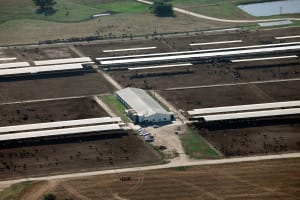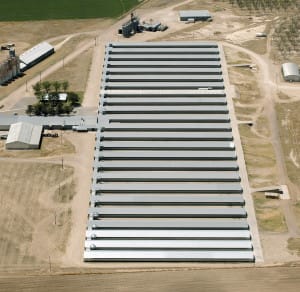Cornucopia’s Aerial Photography Investigates Factory Farm Cheating
by Will Fantle
When The Cornucopia Institute was founded in 2004, a primary goal of the fledgling organic watchdog was to draw attention to and rein in abuses from the rise of factory farm confinement dairy operations in organic agriculture. Not only were these industrial-scale operations squeezing out the opportunity for family farmers to make a real living in organics, they were also cheating consumers who thought they were purchasing a healthy food produced humanely with sustainable practices.
Cornucopia’s spotlight focusing on the scofflaws and abuses led to the loss of organic certification for several operations, as well as to the creation of a farmer and consumer drive that ultimately won the passage of new regulatory benchmarks for pasturing for dairy herds and other ruminants. Yet confinement-style factory farms, like a stubborn weed, persist in organic agriculture. These giant operations have become widespread and dominant in egg production, and continue to produce a significant amount of the organic milk.
Regulators at the USDA have been asked how these operations can be considered to comply with federal organic law. “The head of the USDA’s National Organic Program, Miles McEvoy, told me he had personally visited some of the huge complexes located in Texas that we photographed,” says Mark Kastel, Cornucopia’s Senior Farm Policy Analyst. “And,” continues Kastel, “he further told me that, and I quote: ‘all the farms we visited in Texas were in compliance.’”
“Obviously, Mr. McEvoy and The Cornucopia Institute have a starkly different interpretation of the organic regulations and enabling legislation passed by Congress,” Kastel adds. “And the majority of the organic community shares Cornucopia’s interpretation.”
 |
| Some of the thousands of cows in the feedlot at one of Aurora Dairy’s “organic” farms in Texas. Click on image to enlarge. |
Reports and evidence gathered by Cornucopia continue to contradict the USDA’s assessment. To further buttress this case, Cornucopia this summer began using aerial photography across the United States to gather direct and dramatic graphic evidence that animals on these factory farms are not being managed in accordance with organic law.
Federal regulations explicitly state that living conditions for organic livestock must “accommodate the health and natural behavior of animals.” For chickens, that means the birds are outdoors, foraging and feeding, dust bathing, and scratching about. Cows should be out grazing on pastures.
All species, according to organic regulations, are to have year-round access to the outdoors, shade, shelter, exercise areas, fresh air, clean water for drinking, and direct sunlight. While temporary confinement is allowed, it is only intended for circumstances such as inclement weather, safety, care for illness or injury, and risks to soil or water quality.
Cornucopia’s eye in the sky is revealing that violations to the spirit and the letter of federal organic law appear to be occurring. At one factory dairy in Texas, all of the cows are confined in a feedlot; none are out grazing and moving about on the surrounding fields. In fact, these nearby fields have been freshly mowed with the feed already baled for future use. “We see thousands of cows at this operation without any pasture as organic law requires,” Kastel observes.
Overhead of a massive egg laying facility in Texas, Cornucopia’s aerial images capture an absence of chickens outside the rows of barns in which they are confined by the tens of thousands. The plane’s camera also records a grossly inadequate amount of land allocated for the hens and totally inappropriate for their density even if they had actually been outside.
Hundreds of images from Texas to Massachusetts have been catalogued by Cornucopia and are being evaluated and assessed. The operations under aerial examination were identified from farm visits, industry sources, satellite imagery, and tips from Cornucopia “intelligence agents” (members) across the country.
“We intend to use these photos to demonstrate, where applicable, how and why organic regulations are being broken,” says Kastel. “If the USDA fails its congressionally mandated enforcement responsibilities, we will likely ask for congressional hearings and/or end up in court. We will continue to protect the interests of ethical organic farmers and their dedicated customers who choose food from animals that are cared for in a humane manner resulting in nutritionally superior products.”
Ten years ago, when Cornucopia first began raising awareness about the creep of factory farm, confinement-style livestock operations into organics, the organic industry pulled in $12 billion a year. Today it has tripled in size.
But that explosive growth in the size of the organic market has not fostered a similar increase in the number of farmers involved with organics. One big reason that a corresponding growth in organic farms in the U.S. hasn’t materialized is the lack of a level playing field. The cheaper confinement-style management model, employed by industrial-scale operators, allows them to squeeze out competitors who follow the letter of the law. Sadly, some family farmers are even exiting organics due to the low farm gate prices they receive for their commodities and foodstuffs.
So how can real food advocates and conscious consumers know that the organic food they are purchasing is coming from farmers faithfully following the best organic practices? This question is especially poignant given that legal actions filed by Cornucopia against suspected organic scofflaws can drag on for years before final resolution. In one case, Shamrock Dairy in Arizona, USDA investigators confirmed Cornucopia’s initial allegations that Shamrock was operating illegally, yet nearly six years since the initial filing, due to appeals the scofflaw operation is still selling “organic” milk.
To help the public make wise marketplace decisions, Cornucopia’s researchers have created commodity scorecards grading brands of organic egg, dairy, soy foods and other products found in grocery aisles. By consulting these scorecards (www.cornucopia.org), consumers and wholesale buyers can identify foods available in their region that they can purchase with confidence.
According to Jason Cole, Cornucopia Research Associate, the scorecards are updated in real-time. “It’s an ongoing project,” he says. “We are making several updates on a monthly basis. We want consumers to have the most current information so they can support the true farmer heroes engaged in sustainable, ecologically sound and humane agriculture.”


